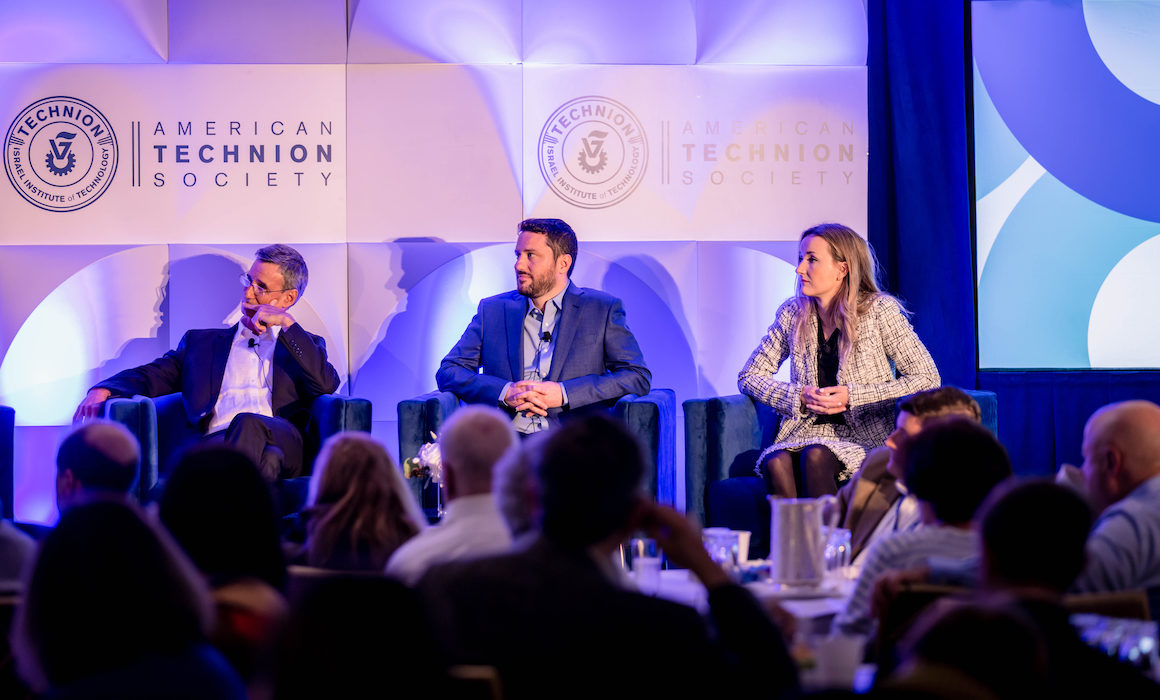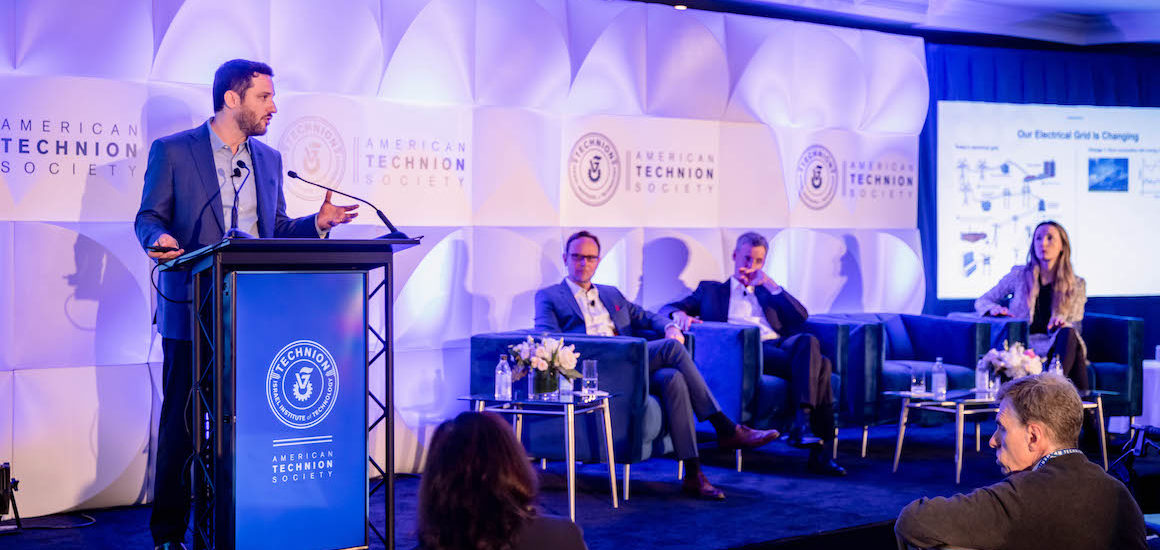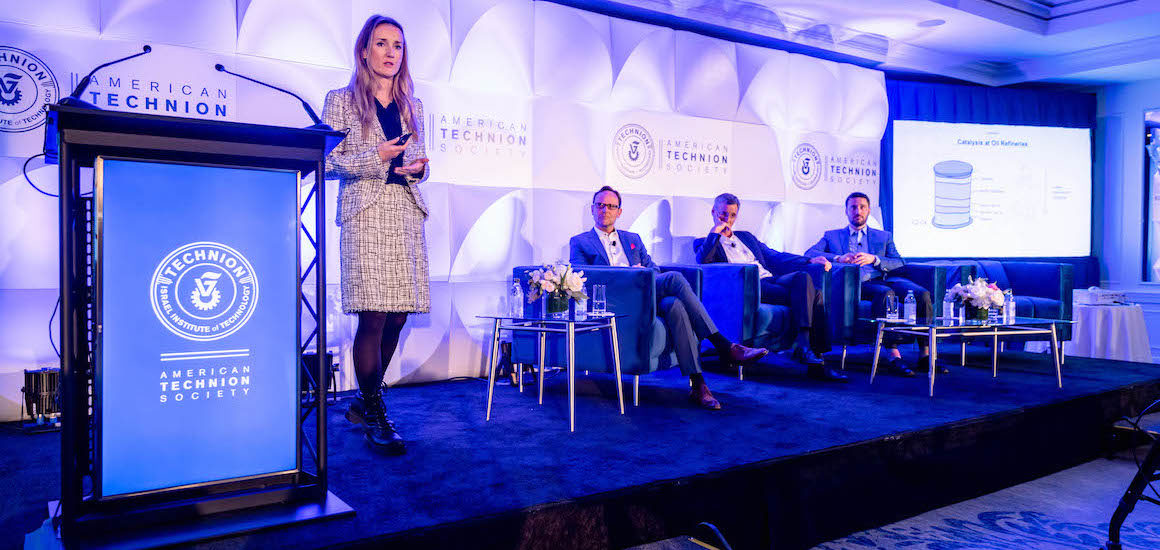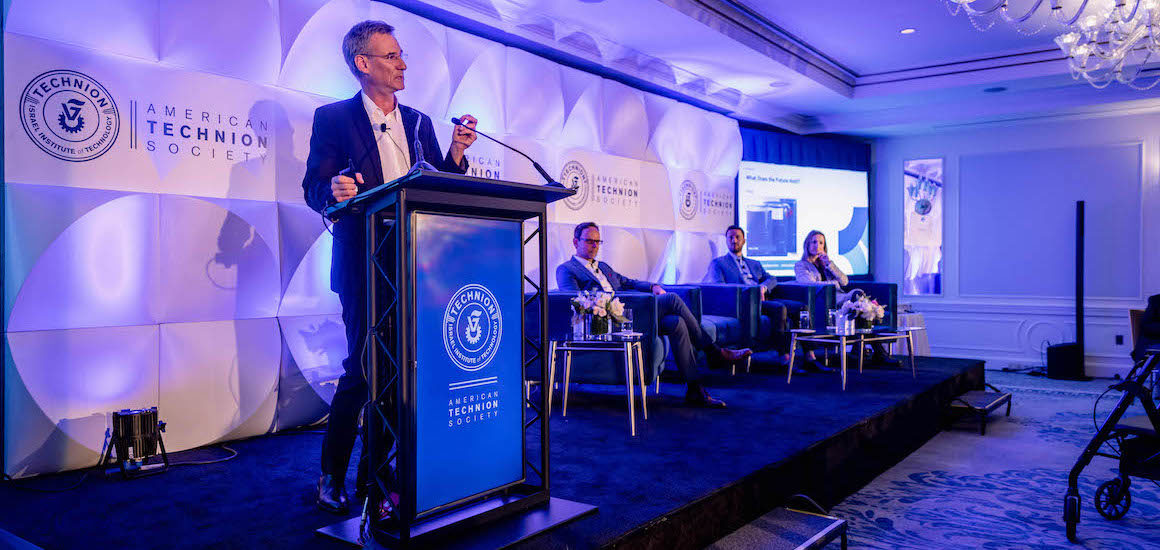“I think crude oil is amazing,” said Associate Professor Charlotte Vogt, who ticked off a list of products from purses to curtains and shag rugs that are made from fossil fuels. “That’s probably not something you’d expect to hear from somebody who is focusing on sustainable processes,” she added. But while she called “humans and oil” a love story, she warned that it has not been a happy one for our environment. “What we emit today (in carbon dioxide emissions), will have a maximum effect in global warming in 10 years. And that’s scary.”
Prof. Vogt was speaking at the American Technion Society’s Presidential Forum in March on sustainability and catalysis, moderated by Professor Peter Schreiner of Justus Liebig University in Germany, alongside Technion researchers Professor Ilan Marek of the Schulich Faculty of Chemistry and chair of the soon-to-be-launched Center for Sustainable Processes and Catalysis, and Associate Professor Matthew Suss, head of the Cleantech Innovations Lab.
A catalyst is something that speeds up a chemical reaction, or lowers the temperature or pressure needed to start one, without itself being consumed during the process. Likening the “magic of catalysis” to helping a person climb a steep hill to get home, Prof. Schreiner explained a chemical catalysis makes the proverbial hill smaller, reduces the energy needed to perform a task, sends the reaction in the right direction, and is sustainable.
While many of us think our to-go coffee cups are completely recyclable, they’re not. Prof. Schreiner quoted statistics stating that some 16 billion coffee cups, which are coated inside with plastic laminate and contain plastic lids, are dumped into U.S. landfills every year. With current world population projections indicating the global population will reach 10 billion people by the year 2057, up from 7.8 billion in 2020, the number of trashed coffee cups will grow exponentially.
“If we want to keep the same quality of life, we have to produce more,” said Prof. Marek. Since we need the added products, the question becomes, “how can we produce better?” That’s where the new Technion Center for Sustainable Processes and Catalysis comes in.
The Technion’s vision is to create a multidisciplinary incubator of young talents that would become a hub for sustainability and catalysis in Israel. The Technion would recruit young researchers worldwide from various disciplines. They would spend seven years working side-by-side at the Center, researching and creating new catalysts that could be applied to biomedical engineering, food tech, chemical engineering, and other fields. They would then return with an enriched perspective to their individual faculties at the Technion. “This is something unique. Not a single place in the world will have such a center,” Prof. Marek said.
The center would require a new building to provide researchers with a central meeting place. It would be constructed with few walls and plenty of open spaces to stimulate an interactive environment in which the multidisciplinary faculty would share the work bench, state-of-the-art equipment, and perhaps most importantly — share ideas. “This mixing is like a bottle of champagne,” he said. “When you shake it and pop the cork, you have bubbles everywhere. That’s exactly what we want to do. We want to create a place where faculty members will come with brilliant ideas and will rotate in and out. It will never be a static system.”
“Issues of sustainability are global issues and not a single person will be able to solve them alone,” Prof. Marek added. “We need to mix knowledge.”
Prof. Vogt is in that mix. On a mission to turn back climate change, she joined the Technion’s Schulich Faculty of Chemistry in March 2021, where she established the Vogt Laboratory of Catalysis for Fuels of the Future. She told Presidential Forum attendees that in 1980, people living in Los Angeles were told to stay inside for their well-being as the air was so polluted. Since then, even as the number of automobiles has almost quadrupled, the air is clear. “What happened?” she asked. “You can guess we used catalysts for the good.”
Researchers in her lab are working on a broad range of catalysts for applications in plastics, the production of ammonia for fertilizers, and excess CO2, trying to turn carbon dioxide into useful fuels and chemicals. Prof. Vogt, who was selected for the prestigious Forbes “30 under 30 Europe 2021,” hopes to develop new catalysts by using innovative methods of spectrometry, or light sources, in her investigations.
Prof. Matthew Suss spoke about his research in energy and the electric grid, which he would continue in the prospective Center. Currently, the U.S. gets 60% of its electricity from oil, coal, and natural gas. “We’re seeing more and more renewables integrated into the grid,” he said. “But the question is why can’t we go entirely to renewables?” He is creating innovative batteries that could potentially provide safe, low-cost, scalable solutions for storing clean solar and wind energy for electricity when the sun isn’t shining and the wind isn’t blowing.
Prof. Schreiner closed the session with hope for the future. “My dream is that 100 years from now, when your grand, grand, grand children are sitting in this room, and hopefully my grand, grand, grandchild will be on the podium, we’ll be able to say we’ve solved many important problems for humankind with the combined expertise of the Technion Center.”





